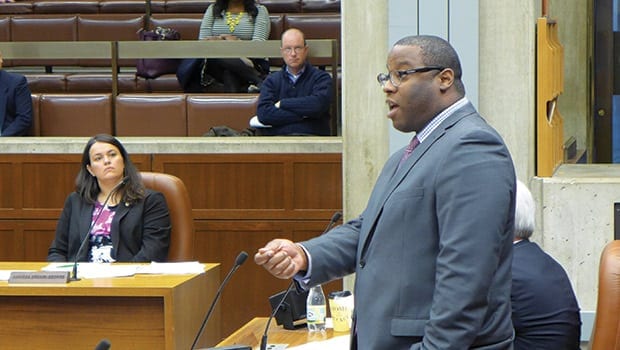
Northeastern University’s new safety plan has drawn praise from some and left other students, community members and officials feeling less safe than before. The plan: train campus police to use semiautomatic rifles against high-level threats.
Currently 20 of the 65 NU Police Department officers are learning to handle the weapons, which will be deployed in their vehicles during emergencies. Officers carry handguns, and NUPD has owned such rifles for years, but until now has not had an official deployment policy.
Last Wednesday, Josh Zakim and Tito Jackson, city councilors whose districts encompass much of Northeastern, called for a hearing on the issue.
Equipping campus officers with greater firepower than that carried by Boston Police Department officers is unnecessary and a recipe for accidents, some students and officials said. Zakim and Jackson admonished university officials for failing to involve or alert the surrounding community.
Ralph C. Martin II, NU senior vice president and general counsel, argued that the rifles are critical. Should there be an active shooter, the administration cannot spare minutes waiting for city police to arrive, he wrote in a letter to the city council.
No time to spare
The edge of Northeastern’s campus is across the street from BPD headquarters, causing some to argue that the university already is well-protected.
“The Boston Police Department is well equipped and trained to respond within minutes to incidents that require an elevated tactical response,” BPD Lt. Detective Michael McCarthy told WBZ. Police Commissioner William Evans told WGBH that the rifles were unnecessary and BPD could arrive on NU’s campus within six minutes.
NU’s Martin argues that is too long to wait.
“FBI data suggests that the vast majority of active shooter situations are over in less than 5 minutes, and a quarter are over in less than 2 minutes,” he wrote. “Actions by first responders within the first few minutes can help reduce fatalities and severe injuries. Proximity to these emergencies is key — Northeastern’s officers are on campus and will always be the first responders.”
The responsibility for protecting students, he said, ultimately lies with Northeastern, and its officers know the campus best.
NU’s increased firepower is not unique: Officers at MIT, Boston University, Tufts and UMass Boston also are equipped with semiautomatic rifles.
Fears rise
In a Dec. 11 letter, members of Northeastern Students Against Institutional Discrimination said equipping the rifles has dangerous implications.
“This action has the potential to lead to police misconduct and disrupt trust between the community and administration,” stated the letter, posted on Facebook. “Limited training in cultural competency and racial sensitivity in conjunction with the excessive use of force by police departments negatively impact black and brown individuals.”
Third-year NU student Marley Kimelman’s online petition against the rifles has garnered more than 7,500 signatures.
Zakim and Jackson underlined a similar point in a December letter to NU President Joseph Aoun.
“This is a step backwards for community policing and encourages mistrust and fear between NUPD and Northeastern students, as well as Mission Hill and Roxbury residents who often come in contact with NUPD,” the councilors wrote.
Although NUPD has no jurisdiction off-campus, the university is embedded in neighborhoods, making the officers a regular presence to residents, Zakim said.
BPD’s McCarthy told WBZ that firepower is not the answer: “Community policing and community engagement, two things the Boston Police are experts in, always prove to be a more effective tool than any piece of equipment an officer can carry.”
No voice in the matter
Among the largest complaints levied against NU is the allegation that it did not consult or inform the community, campus and officials prior to initiating the plan.
“The community should not find out about these types of weapons being deployed in the community in the newspaper. That’s unacceptable,” Jackson said. “I think this sets a pretty bad precedent.”
The approach contrasts with NU’s prior community outreach over plans such as new building construction, he added.
“They undertook this over objections of the Boston Police Department, the [police] commissioner and without conduction any outreach,” Zakim said. “People are nervous. This just came out of nowhere.”
NU’s Martin disputes that the BPD was taken by surprise.
According to Martin, NUPD Deputy Chief Ruben Galindo briefed Cpt. Patrick Crossen on the plans in late October and discussed training opportunities. A week later, Galindo met with Commissioner Evans. NU officials were informed that Evans first learned of the plans at that time and “that he appeared to be upset.”
Galindo and NUPD Chief Michael Davis met with Evans in November, where Martin says they discussed tactical weapons and deployment strategies. In December, Evans spoke against the plan on WGBH radio.
Contention among councilors
During a city council meeting, Jackson and Zakim critiqued the process and plans. Councilor Matt O’Malley also questioned if high-power weapons were the solution.
“There are new threats that didn’t exist before, and we want to keep everybody safe, but that doesn’t mean we need to have this kind of weaponry,” he said.
Councilor Michael Flaherty said that while better notice should have been given, arming campus police with rifles is a life-saving measure. To combat a shooter, officers must be able to return equal firepower, he said.
“If you’re a parent of a kid on campus, you want to be able to match that firepower pretty quickly. We know once [the shooters are] met and that firepower is matched, they tend to turn the firepower on themselves and that threat is stopped,” Flaherty said.
Quick response, he said, is critical.
“Having this firepower readily available for academy-trained officers is advisable,” he said. “It’s going to be that Boston campus police officer that’s first on the scene. Boston’s on its way, but while it’s on its way people are being killed.”
O’Malley, Jackson and Flaherty are all members of the Committee on Public Safety and Criminal Justice.






